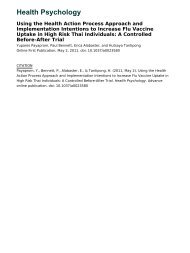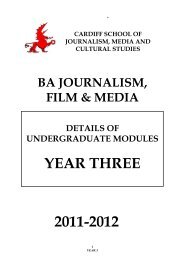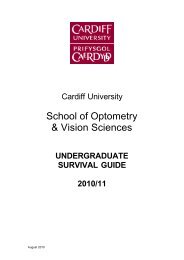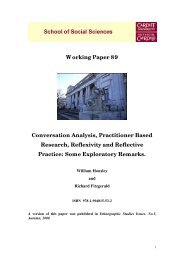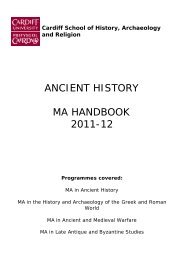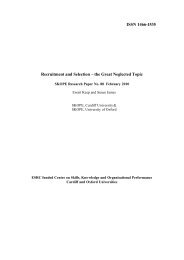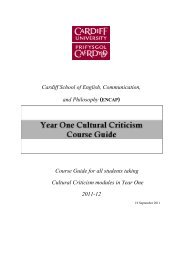Year 3 Catalogue 2011-2012 - Cardiff University
Year 3 Catalogue 2011-2012 - Cardiff University
Year 3 Catalogue 2011-2012 - Cardiff University
Create successful ePaper yourself
Turn your PDF publications into a flip-book with our unique Google optimized e-Paper software.
MODULE Criminological Practice CODE: SI0204 SEMESTER(S) Both<br />
TITLE:<br />
MODULE Mr Adam Edwards CREDITS: 20 LEVEL: 3<br />
LEADER:<br />
CONTACT DETAILS Room 1.10B TEL: 029 20874174 E-MAIL: EdwardsA2@cardiff.ac.uk<br />
MODULE AIM(S)<br />
• To examine the relationship between research<br />
design, methods, data analysis and the narration of<br />
findings in criminological practice;<br />
• To consider the relationship between science,<br />
politics and ethics in criminological practice;<br />
• To examine the relationship between the<br />
representational and performative goals of<br />
criminological research.<br />
On completion of the module a typical student will<br />
be able to:<br />
KNOWLEDGE AND COMPREHENSION<br />
• Comprehend the relationship between research<br />
design, methods, analysis and narrative in<br />
contemporary criminology.<br />
• Comprehend how practical examples of<br />
criminological research demonstrate different<br />
relationships between design, methods, analysis<br />
and narrative.<br />
• Comprehend normative and empirical arguments<br />
over the appropriate relationship between science<br />
and politics in criminological research.<br />
• Comprehend arguments about the representational<br />
and performative goals of criminological research.<br />
SKILLS (APPLICATION AND ANALYSIS)<br />
• Demonstrate an ability to conceptualise the<br />
relationship between science and politics in<br />
criminological research.<br />
• Demonstrate an ability to criticise the relationship<br />
between design, methods, analysis and narrative in<br />
exemplars of criminological research.<br />
UNDERSTANDING (SYNTHESIS AND EVALUATION)<br />
• Appreciate the tensions between science, politics<br />
and ethics in criminological practice.<br />
• Understand different narrative styles for composing<br />
criminological arguments.<br />
• Compare, contrast and criticise the goals of<br />
representational and performative knowledge in<br />
criminological practice.<br />
TRANSFERABLE SKILLS<br />
The module will contribute to the development of the<br />
following transferable skills:<br />
Composition and communication of oral and written<br />
arguments; interpersonal skills in small-group work;<br />
debating skills developed in deliberative seminar<br />
discussions; conceptual and analytical skills in<br />
comprehending, analysing, synthesising and evaluating<br />
arguments; equipping students with the ability to<br />
understand the practice of criminological research.<br />
SYNOPSIS OF MODULE CONTENT<br />
The module builds on the study of research design,<br />
considered in the second year ‘Theory and Method in<br />
Contemporary Criminology’ module (SI0200), by<br />
examining those relationships between design,<br />
methods of data collection, strategies of data analysis<br />
and the narration of research findings that together<br />
constitute criminological practice. Having defined<br />
criminological practice in these terms, the lecture<br />
programme considers arguments over its ‘scientific’<br />
and/or ‘political’ character. Orthodox research goals of<br />
disputing the reality of criminological problems are then<br />
contrasted with the performative role of criminology in<br />
imagining how else these problems could, and should,<br />
be construed and acted upon. Criminological practice is<br />
examined in relation to the communication of research<br />
findings to different kinds of audience (e.g. scientific<br />
peers and students, public policy-makers, pressure<br />
groups, journalists, the general public and their elected<br />
representatives). Controversies about the ‘vocation’ of<br />
criminological practice are explored through reference<br />
to examples of particular research projects, discussed,<br />
where possible, by the authors of the research in<br />
question. The module advocates a sociology of<br />
criminological knowledge that challenges students to<br />
think about how, and for whom, such knowledge is<br />
produced and with what consequences.<br />
METHODS OF LEARNING AND TEACHING<br />
A mixture of individual and group learning activities are<br />
adopted on this module. In addition to the lecture<br />
programme students will undertake work individually, in<br />
pairs and in small groups in seminars and will have the<br />
opportunity to engage in debates involving all seminar<br />
participants. All students will be expected to undertake<br />
reading and forms of self-directed learning in advance<br />
of seminars and in preparation for the submission of<br />
module assignments.<br />
OPPORTUNITIES FOR FORMATIVE ASSESSMENT<br />
Students will receive formative feedback on group work<br />
undertaken in seminars and it is envisaged that<br />
summative feedback on the Autumn Semester<br />
assignment will also play a formative role informing<br />
students’ learning on the Spring Semester lecture and<br />
seminar programmes.<br />
ARRANGEMENTS FOR FEEDBACK ON WORK<br />
Students receive feedback on formative assessment in<br />
seminars and on summative assessment through<br />
written comments on their individual coursework.<br />
METHOD(S) AND WEIGHTING OF SUMMATIVE<br />
ASSESSMENT<br />
40% Coursework (Essay) 3000 words (Autumn)<br />
60% Coursework (Research Narrative Exercise) 4000<br />
words (Spring)<br />
INDICATIVE READING<br />
Benton, T. and Craib, I. (2001) Philosophy of Social Science,<br />
London, Palgrave.<br />
Bryman, A. (2008) Social Research Methods, 3 rd Ed., Oxford,<br />
Oxford <strong>University</strong> Press.<br />
Carlen, P. (Ed) (2008) Imaginary Penalities , Devon, Willan.<br />
Collins, H. M. and Evans, R. (2007) Rethinking Expertise,<br />
Chicago, Chicago <strong>University</strong> Press.<br />
King, R. D. and Wincup, E. (Eds) (2007) Doing Research on<br />
Crime and Justice, 2 nd Ed., Oxford, Oxford <strong>University</strong><br />
Press.<br />
Layder, D. (1998) Sociological Practice, London, Sage.<br />
Nelken, D. (Ed.) (1994) The Futures of Criminology, London,<br />
Sage.<br />
Sayer, A. (2000) Realism and Social Science, London, Sage.<br />
Smandych, R. (Ed.) (1999) Governable Places: Readings on<br />
governmentality and crime control , Aldershot, Ashgate.<br />
Weber, M. (1991) ‘Politics as Vocation’ and ‘Science as<br />
Vocation’, in H. H. Gerth and C. Wright Mills (Eds.) From<br />
Max Weber: Essays in Sociology, London, Routledge.<br />
OTHER INFORMATION:<br />
This module is restricted to students on the single<br />
honours criminology degree scheme, for which it is a<br />
compulsory core module.<br />
26



